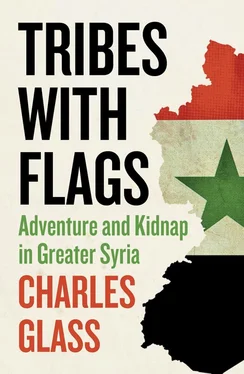At twilight, I took a walk through the leafy streets of old Arsuz. The first place I went was the post office, from which I hoped to make a call to my children in London. It was a tiny stucco shed at a bend in the road. A man sat at a vintage telephone switchboard behind a low counter. He spoke only Turkish, but understood a few words of English. He told me to use a call-box outside and sold me several 250 TL tokens. I tried both telephones outside. Neither worked. I walked back in. The operator, unsurprised, gave me a refund for the tokens. He wrote down my number and called the central operator in Istanbul to book the call. He hung up and said it would come in forty minutes. I went to the hotel to bring a book to read.
When I returned to the post office, there were two other men with the operator. One was a middle-aged worker and the other an old man wearing black sharwal, the billowing Turkish trousers still worn by old peasants, Turkish, Greek and Arab, throughout what had been the Ottoman Empire. The old man, who was born when the province was part of Syria under the Sultan Abdul Hamid, and spoke a few words of Arabic, invited me to his house for coffee, but I explained that I had to wait there for my call home.
So much and so little had changed since the old man was born. He dressed as his forebears did in the last century, and he had the hands of a man who worked the land just as they had. It mattered little that there was now a telephone link to London via Istanbul, because he had no need to call either city. There was no longer a Sultan, and the French army had interrupted Turkish rule for twenty years, the blink of an eye, before he went back to living with the polis who had kept a kind of order since 1845. Yet there were now a modern hotel, European tourists and a Turkish nation-state, all of which might pass away, leaving old men in sharwals whose sons would work the land as they and their fathers had. Or would the land and the sea which had always provided the peasants’ and fishermen’s bounty be turned over forever to package holidays for the fair-skinned Goths and Gauls who, in centuries past, had been unable to hold them by force of arms?
The sun was nearly setting when I reached the fields outside Arsuz. I had walked along the coast road and then up footpaths through the meadows, some of wheat, others of grass where sheep and goats were grazing. The foothills seemed to hold back a few clouds, leaving the sky near the sea an undisturbed mingling of red and blue, slowly giving way to blackness. Cut into the hillsides were level plots of earth upon which stood small houses, which from a distance looked adobe, the colour of the exposed earth around them. As the sun receded on the horizon, peasants slowly made their way from the fields, carrying their tools. The men wore black sharwals or khaki trousers, and the women’s long dresses trailed in the dust. Covered in sweat and dirt from a day’s labour, they seemed almost the colour of the earth, the colour of the houses they were entering, the colour of the hard ground neither they nor their ancestors had ever escaped. And they were as silent as the crops under their feet.
It was dark when I returned to the hotel. Wedding guests were arriving. The men wore new suits, many with lapels too wide or trimmed in black or brown, and the women wore dresses of chiffon or imitation lace. Shoes were shined, hair combed back and hands scrubbed. Alawis had come from Arsuz and nearby villages for what would be three days of celebrations. Some were the farmers I had watched make their way home at sunset. In the dining-room, transformed for the night like the guests, more than a hundred people danced, clapped in time to the music or sat exhausted after twirling around the floor. They were doing village dances, like the dabke in Lebanon or bouzouki in Greece, with each dancer holding high the hand of another to form a large circle as everyone’s feet kicked in unison to the music. Although the band was Western, with a drummer and synthesiser, its music was modern Oriental pop.
Outside, small children were playing on the beach and in the courtyard, chasing one another through the darkness. Some older children, boys and girls, stood by the windows and stared inside. As the evening wore on, more people retired to the chairs at the edge of the room, some of the oldest dozing contentedly. In the middle of the circle of dancers were the bride and groom, each with dark, curly hair and a little overweight, swaying to the rhythm. She was still in her white bridal dress, and he wore an ill-fitting white suit. Men took turns in approaching the bride and showering her with money while she danced seductively alone. Little boys would dart up to her feet to pick up the 100 TL notes, which they would present to the newlyweds at the evening’s end.
This was traditional village revelry, but the modern world was encroaching. A man was recording the evening on a video camera; the band had amplifiers and speakers, superfluous in a room so small; the men wore Western suits, the women shop dresses, costume jewellery and fur coats. A grocer’s son had married the daughter of the village sheikh. Arsuz’s richest Alawi family was now one with its most respected. These were signs of a new age, of growing wealth. Perhaps there were no more villagers, none of the peasants I had imagined at sunset, only the aspirant petit bourgeoisie.
The celebrations ended at midnight, when the band packed its drums and guitars, the video cameraman took down his lights, the waiters dismantled the tables and folded the chairs, and the families made their way home. Before dawn, most of them would be back in the fields.
In Alexandretta I had a lunch of grilled shrimps and a bottle of Efes near the port and then went to a photocopying shop. I had decided to photocopy all my notes and send them home in case something happened while I was travelling. The photocopying shop was on a corner, with picture windows on two sides and old calendars hanging on the walls. Inside, a man was photocopying documents and pages from books for the people queuing up. One of the five or six young men ahead of me in the queue turned and asked me in French whether I spoke French. He then asked where I was from, why I had come to Iskenderun and where I was going. It was not unusual, I had discovered, for strangers to ask the most personal questions. He said he was a French teacher from Istanbul. He asked me if I had read the Bible. He had read both the Bible and the Koran and had translated the Bible into Turkish. “From French?” I asked.
“Yes,” he said. “It is a beautiful book.”
I said nothing, assuming that he as a Muslim was complimenting a Christian on his faith’s holy book.
He turned his back to the other young men in the queue and whispered, “Je crois en Jésus.” (I believe in Jesus.)
I was startled and looked into his eyes. He was completely sincere. I had once met a so-called “Jew for Jesus” in Jerusalem and found him completely mad. The Jew for Jesus had followed me to my hotel, proselytising on the way, insisting the Temple in Jerusalem be rebuilt. When I asked why, he said matter-of-factly, “Because that will cause the end of the world.” Had I now encountered a Muslim for Jesus? “Vous êtes musulman, n’est-ce pas?”
“Oui, je suis né musulman.”
“Et vous croyez en Jésus comme prophète?”
“Non,” he insisted. “Je crois en Jésus.”
“Et Mohammed était un bon prophète,” I said, helpfully.
“Non, Mohammed n’était pas prophète.”
We talked a while longer, until each of us had completed his photocopying. He was on his way to Istanbul and I to Antioch, so we could not continue the conversation. He was the second Muslim convert to Christianity I had met in five days. In Antioch, I would learn of others, but I had no idea whether I had by chance met every Muslim turned Christian in Turkey or by an equal chance uncovered a trend. I decided to leave it to the anthropologists and missionaries, but I remembered Sir Steven Runciman’s words to me before I left on my journey: “I think the Seljuk Turks might easily have become Christian. They had converted to Islam, but they were very easygoing. It seems surprising, but quite a lot of Seljuk Turks did become Christian from being Muslim. There was a certain amount of inter-marriage. If they had become Christian, you’d have had a new Byzantium.” That was at the time of the Crusades. In the unlikely event of enough Turks becoming Christian now, the capital of the new united Europe might be Constantinople.
Читать дальше












